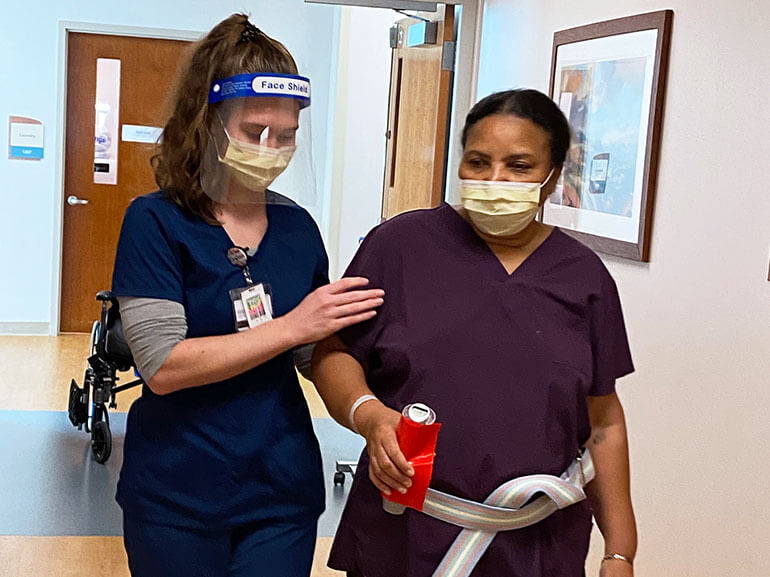Purette's story

Purette Mills is a 67-year old retired physical education and music teacher who was furthering her education by working on her doctorate in educational leadership. Purette’s passion is working with women. She is the vice president of a non-profit focused on educating and empowering women to leave the welfare system, introducing them to various careers, helping provide for their needs and more. A mother of three sons, Purette moved from Alabama to Florida to become her mother’s caretaker.
In early November, Purette was going about her day when she attempted to use a pair of scissors and found herself struggling. Because she was showing other signs of a stroke, including right-sided weakness and difficulty speaking, an ambulance was called and Purette was taken to North Florida Regional Hospital. In the emergency room, she was screened and it was confirmed she suffered a stroke. Purette was given a tPA, or “clot busting” drug, which is used to break up the clot that is causing a blockage or disruption in the flow of blood to the brain.
A week after suffering the stroke, Purette had stabilized and was transferred to UF Health Rehab Hospital for extended recovery. There, she set goals to relearn how to use her right hand again and gain strength in her right leg. Her physician-led team of nurses, physical, occupational and speech therapists devised a plan to get her there.
Physical and occupational therapists utilized electric muscle stimulation, mobile arm support and adapted equipment to help Purette increase the strength and range of motion in her right arm and leg. “Purette was such a pleasure to work with and was so motivated. She was always game for anything I threw at her and the results really showed,” Purette’s occupational therapist said. Speech therapists worked with Purette on techniques to help with swallowing and exercises to aid her in communicating more clearly.
Purette said that while therapy was never enjoyable in the moment, her therapists pushed her to reach her potential and seeing small improvements each day kept her motivated. She admits that she was feeling down and discouraged when she arrived but said, “Everyone was so nice and helpful. The fact that the staff was great made me look forward to therapy.” Purette experienced a number of major milestones while in rehab, the first of which occurred the morning she was finally able to get out of bed by herself. Other “a-ha” moments include when she was able to finally stretch her fingers and make a fist and when she began to walk again.
Purette credits her son Arell, who surprised her by coming to Florida and helping her through her recovery providing daily support and motivation. “It was really nice spending time with him. It would have been a lot worse if he wasn’t there,” said Purette.
After several weeks at UF Health Rehab Hospital, Purette was ready to move on to outpatient rehabilitation and home therapy. At discharge, she was able to get in and out of bed, walk 500 feet and walk up 15 stairs with light supervision. Her right arm’s function had greatly improved and she was mostly independent in completing her personal care; she only needed help getting her hair in a ponytail.
Purette is looking forward to going shopping and eventually returning to school to finish her doctorate. She said her time at UF Health Rehab Hospital was “excellent,” stating that the experience was transformative in many ways. “I learned to dig into myself for motivation. I realized that I had been teaching a lot of things to my students that I didn’t think applied to me, but now I know that they do.”
Purette recommends that anyone going through a similar recovery journey to “listen to your therapists and pay attention to their advice. They always encouraged me when I beat myself up. I used to think that when they encouraged me, they were just doing their job, but now I realized that they truly cared. They loved me, and when you feel loved, you do better.”